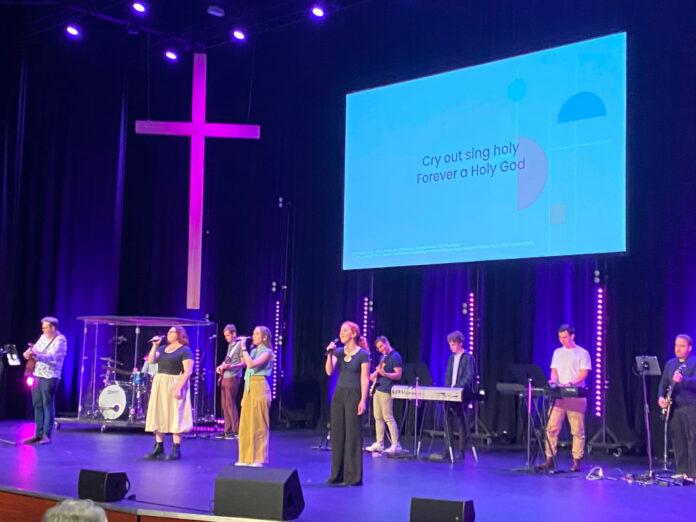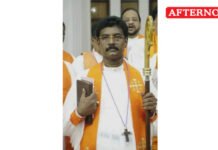Sydney Archbishop Kanishka Raffel visits churches every week, and “virtually every week”, he hears stories of people coming to Christ. Raffel urged delegates not to be ashamed of the gospel speaking at the Gafcon (Global Anglican Future) Australasia Conference, currently being held at the spacious Riverlife Baptist church in Brisbane. Several hundred delegates from New Zealand and New Guinea have joined Australians from every State and Territory.
“One of the hard things about the [Archbishop’s] role that I have is that we go to different churches every week, but that’s also a gift because I get to travel around the diocese of Sydney and see local churches in all kinds of different communities and areas where they are seeking to make Christ known,” Raffel told the gafconites. “And I just find that absolutely thrilling. I find it constantly encouraging and I just meet ordinary Anglicans Sunday by Sunday who tell me about what the Lord is saying to them in their Bible reading or they’re responding to the people around them or who they’re praying for.”
Preaching from Romans 1, Raffel urged the delegates not to be ashamed of the gospel of Christ and observed that he sees the gospel advancing everywhere.
But Raffel also told a story against himself. Well, almost against himself. “It was 2002 – years ago. In my last job as a pastor, I prayed when I began for God to give me someone to share the gospel with. And at the door, a Chinese man said to me that his daughter was coming to the youth group. And so he thought he would come too. And was there someone who could explain to him the Bible? And I thought, ‘Oh gosh, someone to explain the Bible to this Chinese man, and I’ve only been in the church about three or four weeks.’ I said, ‘I’ll find out.’
“Thankfully, he came back the next week, and I said, ‘I’ve got someone to read the Bible with you. It’s me.’ So we started to read the Bible, and if you ever had the privilege of reading the Bible with a person who has never read it before, it’s like watching lights go on as they see things and read things they’ve never seen or heard before. And he had endless questions about everything we were reading.
“Eventually, we were reading Mark’s gospel and eventually we got to the crucifixion and the tearing of the curtain into, and I said, and ‘as the curtain was torn In two, Jesus died on the cross and made a way for us to go. God. And my friend sitting in my office just shed a tear and said, ‘That is amazing love.’ Praise God. He was baptised a few months later.”
Raffel picked one story from his church visits: “I was visiting one of our churches in the Western suburb recently. It’s not a very well-resourced church. They leafleted the local area.
“A man whose home they delivered the leaflet to was thinking of taking his own life. He’d gone down to the railway station to throw himself in front of the trains. As the train came in, the sun was on the train, he was dazzled, and he stepped back. When he got home, he found a leaflet in his mailbox from his local church. So he went there and he met the minister and he started to read the Bible with him and he found a reason to live. Hallelujah.”
Raffel concluded: “Jesus lived the perfect life, we cannot live. And in his death posed the death we owe but cannot pay by faith. When we put our trust in Christ, we united to him so that his death is accepted for our sin. His life is credited to us, and we are declared righteous. He bears our guilt. We are clothed in his dignity by faith because it is by faith and not by works.
“There’s no room for boasting and pride about our moral achievements which are puny, compromised and incomplete. And yet at the same time, there’s no cause of despair. Because the work of Jesus is perfect and spotless and glorious, and it’s credited to everyone who puts their faith in Jesus. Everyone who opens an empty hand to receive mercy from the righteous God who is both holy and merciful. Paul is eager, obligated to Greek and non-Greek to the whole world. He’s not ashamed for the gospel is God’s power for salvation.”
Reports from around the country showed the vastly different contexts evangelical Anglicans face. From the Diocese (region) of Central Queensland, Jennifer Hercott described the diocese as looking in the past like a place a bushfire has been through. But “we’ve got green spots. The growth is coming, new growth is happening. We’ve got people coming to Christ, we’ve got people coming back to church. We have got people being baptised. We’ve got the gospel being proclaimed in places where that has not been the case for a generation. So I’m giving thanks and celebrating Rockhampton. We’ve got an Orthodox bishop in Rockhampton. Yeah, so I’m celebrating that and I’m celebrating those who have served with us in central Queensland who have moved on to other places.” She put in an “unashamed plug” for ministers to come north.
Chair of Gafcon Australia, Peter Smith, who is the minister at Dalkeith Anglican in Perth, recounted the transformation he saw growing up in Armidale Diocese. “Today think you look across that amazing diocese and there’s in every patch without exception, an orthodox Anglican teaching the faith, it’s a miracle.”
Dave Hanger from Grafton told the meeting about living in a Diocese where being an evangelical is difficult. “It’s a hard field, and there are many discouragements and, frankly, in human terms, not a lot of encouragement. One of the things that I would encourage you to pray for is for those who are still faithfully proclaiming the gospel of living our diocese to be strong and courageous and to persevere, but also to have the courage to continue to stand firm if we are unable to persevere within the life of our diocese. And that day may come.
“What’s kept me going is the firm conviction that the gospel changes people’s lives. And what’s kept me going is the fellowship of brothers and sisters in groups such as EFAC and Gafcon.”
Ron from St Matthew’s Wanniassa parish in Canberra has a story similar to Armidale to tell. “I just want to talk about Canberra Goulburn diocese, the transformation that’s gone on. My wife and I joined the diocese over 40 years ago, and at that stage, there were probably only three parishes in Canberra Goulburn where the gospel was preached and the word was opened regularly. … I never thought that in my lifetime, I would see an evangelical bishop appointed. And our last two bishops have been evangelical. So that’s an amazing thing from my perspective.
“But the other thing that’s been happening in the diocese is that now, and particularly in Canberra, over 50% of the parishes, I would say, where the Bible is open every week and faithfully preached. So that’s a dramatic change over the last number of decades. Similarly, [from] St. Matthews, we planted a congregation to the south. There was a valley called Lanyon Valley that didn’t have any Christian ministry in it. We planted a church there and that church has gone on to plant another one, which is quite exciting, but that’s just not happening there.
“Malcolm Richards took over the Gungahlin Parish when it was languishing and it’s now planting churches in the north of the city. In some of the other centres around the diocese, such as in Goulburn and Wagga Wagga and other places, the churches are deliberately looking for opportunity to plant other churches.”
“But the most exciting thing for me more recently in Canberra Goulburn is that the gospel has been profoundly at work – there has been a revival involved in Goulburn jail. And that revival has been led by former CMS missionary, Dan Evers. He’s attached to our parish, but he goes day by day to Goulburn jail. Some of the most hardened criminals in the country are in that jail, and they’re responding to the gospel. [One} man had been converted, and he’s probably never going to get out of jail for the rest of his life. But he said, ‘I have never felt freer in all my life.’
Peter Palmer, who now leads a Diocese of the Southern Cross church at Beenleigh in Brisbane, remembered the last Gafcon gathering in Canberra. “I celebrate that conference; they gave me a Bishop that I could follow. Bishop Glenn Davies, he’s been such a wonderful person to me, ringing me up and talking to me.
“I felt loved again. It had been 18 years since I worked under a bishop who actually rang me and said, ‘How are you?’
“I am eager for this conference to be over.”
“Over? Why?” Jen Hercott asked Palmer.
“Why do I want to be over? Because this Sunday afternoon, we start a new church plant. We have no funds, no nothing, just a lot of people older than my generation are out there this week letterbox dropping about 26,000 people.
“That’s what they’re doing. That’s why they’re not here. So next Sunday afternoon at four o’clock we will plant the first second generation [Southern Cross] Diocese Church.”
Image: The worship band at Gafcon 2024. Correction: the account about Canberra-Goulburn talked of “the world being opened”. It now reads the word being opened.
Correction, the name of the chaplain at Goulburn Correctional centre is Dan Evers , not Paul.



